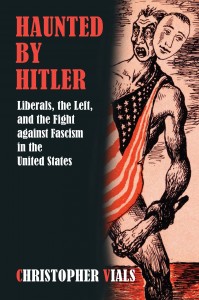Book Review: Haunted by Hitler
Christopher Vials, Haunted by Hitler: Liberals, the Left, and the Fight against Fascism in the United States. University of Massachusetts Press, 2014. 296 pages.
How have activists anticipated, reacted to, and portrayed the threat of fascism in the U.S. public sphere, from McCarthyism and homophobic evangelism?
 Although less a history than a series of episodic essays about aspects of a history, Haunted by Hitler, a new book by Christopher Vials, contains valuable information, speculation, and analysis about how activists have anticipated, reacted to, and portrayed the threat of fascism in the U.S. public sphere. Starting with the birth of fascism in Europe, the book is organized more or less chronologically into seven chapters, the most interesting of which are two that focus on McCarthyism and the gay rights movement, respectively.
Although less a history than a series of episodic essays about aspects of a history, Haunted by Hitler, a new book by Christopher Vials, contains valuable information, speculation, and analysis about how activists have anticipated, reacted to, and portrayed the threat of fascism in the U.S. public sphere. Starting with the birth of fascism in Europe, the book is organized more or less chronologically into seven chapters, the most interesting of which are two that focus on McCarthyism and the gay rights movement, respectively.
Vials’ analysis of McCarthyism documents the sustained attempt of figures ranging from J. Edgar Hoover to Arthur Schlesinger, Jr. to conflate fascism and communism under the headings of “Totalitarianism” and “Red Fascism,” a conflation that has long been both simplistic and wrong. The final chapter, called “Queer Anti-fascism Pink Triangle Politics and the Christian Right” powerfully shows how the gay community has re-deployed the use of the pink triangle as a marker of gay men in Nazi concentration camps to remember the suppressed story of gay oppression. Vials argues that it was the gay and lesbian movement that introduced the idea that an “American incarnation of fascism may well have an evangelical Christian face.” He also demonstrates how gay activists have effectively used anti-fascism “to highlight very real dangers — dangers to everyone of rightwing social movements that strive to create national purity as cultural homogeneity.”
An American incarnation of fascism may well have an evangelical Christian face.
Haunting Hitler makes clear just how prophetic Sinclair Lewis was in his oft-quoted observation that “when fascism comes to America it will be wrapped in a flag and carrying a cross.” But along the way the reader benefits from a variety of observations that Vials makes en passant. Among them, the author notes that figures like Arthur Miller “looked backward because the earlier struggle against fascism—culminating in the victory that seemed to spell the end of rightwing nationalism—augured hope for a better world which they felt was forgotten and betrayed in the America of the cold war years that followed.” On the subject of state-sponsored racist policies, he writes: “the lesson we draw from 1942 [which saw the internment of the Japanese-Americans] is not to wait…until we have positive, irrevocable proof of racism” because then it’s too late to do anything about it. Noting the traditions that shaped one recent figure from the right, Vials notes that Sarah Palin emerged from “a theocratic strand of the Christian right which is the closest functional equivalent of the fascist movement in American politics.” It should be noted that the right is not Vials’ only target. He reminds us in his work that an association between Nazism, anti-communism and the common American call for law and order “was common across the left during the Vietnam war.”
An anti-fascist movement is as necessary now as it has ever been.
Yet Vials seems to argue that the threat is most dangerous from the right. His epilogue summarizes a 2009 Department of Homeland Security Report on the resurgence of right-wing extremism. Concerned that the mainstream is moving toward the right with no mass movement on the left to counter it, Vials recommends a national debate on the subject of domestic violence. He concludes with a call for greater action to counter this mass movement of the right: “an anti-fascist movement is as necessary now as it has ever been.” America, he writes, must recognize a “formidable anti-fascist tradition “and begin calling it by its rightful name.”
Victor Navasky teaches in Columbia University’s Graduate School of Journalism. Among other books, he is the author of Naming Names, which won the National Book Award, and is the former editor and publisher of The Nation magazine as well as the chairman of the Columbia Journalism Review.












